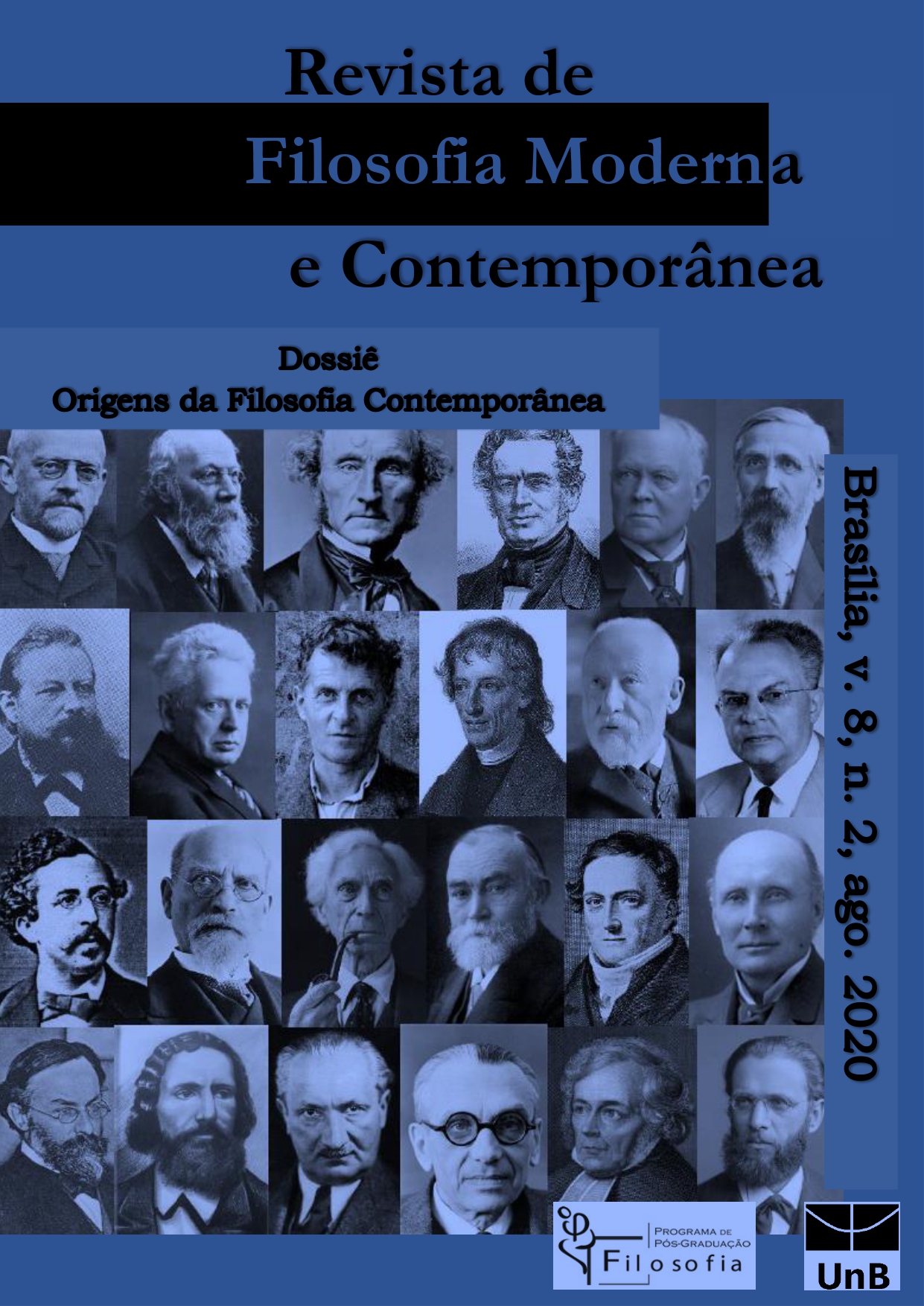Similar Ways of Creating Thirdness
Kant's Synthetic Judgments a priori'' and Frege's Thoughts'' as Intermediate Cases
DOI:
https://doi.org/10.26512/rfmc.v8i2.35848Keywords:
Kant. Frege. Logic. Third concept. Intermediate case.Abstract
It is well-known that Kant and Frege offer seemingly exclusive answers to the (epistemo)logical status of equations. Expressions like “7 + 5 = 12” are synthetic for Kant but analytic for Frege. Nevertheless, Kant and Frege have a shared interest: Demonstrating the possibility of grasping a general real by science. Kant’s question is “How is metaphysics as science possible?” Frege answers the question “How is logic as science possible?” Both thinkers are convinced that a precondition for answering their questions consists in the creation of a third concept. But how? Traditionally given mutually exclusive distinctions seem to let no room for such a different third concept. The revolutionary idea is to create basic concepts as molecules(patterns, Gestalten)with a characteristic inner structure opposed to atoms without any inner structure. Such molecules ”“ Kant’s “synthetic judgments a priori” and Frege’s “thoughts” ”“ can be analyzed as2-dimensionally structured intermediate cases.
Downloads
References
FREGE, Gottlob. Begriffsschrift, eine der arithmetischen nachgebildete Formelsprache des reinen Denkens. Verlag von Louis Nebert: Halle/Saale, 1879. https://b-ok.cc/book/3517171/f28b88
https://gdz.sub.uni-goettingen.de/id/PPN538957069?tify={%22view%22:%22info%22}
______. Die Grundgesetze der Arithmetik. Eine logische-mathematische Untersuchung über den Begriff der Zahl. Breslau: Verlag von Wilhelm Koebner, 1884.
https://archive.org/details/diegrundlagende00freggoog/page/n7/mode/2up
______. Der Gedanke. Eine logische Untersuchung. Beiträge zur Philosophie des deutschen Idealismus 2, 1918-1919a, p. 58-77. http://www.gavaga i.de/HHP32.htm
______. Die Verneinung. Eine logische Untersuchung. Beiträge zur Philosophie des deutschen Idealismus, vol. 1. A. Hoffman (Erfurt) & H. Engert (Dresden), Verlag der Keyserschen Buchhandlung: Erfurt 1918-1919b, p. 143”“157. http://sammelpunkt.philo.at/533/
______. The Foundations of Arithmetic. A logico-mathematical enquiry into the concept of number. Translated by John Langshaw Austin. New York: Harper & Brothers, second revised edition 1953 (First Harper Torchbook edition published 1960). http://www.naturalthinker.net/trl/texts/Frege,Gottlob/Frege, Gottlob - The Foundations of Arithmetic (1953) 2Ed_ 7.0-2.5 LotB.pdf
______. The Thought: A Logical Inquiry. Translation of FREGE 1918/19a. Mind, New Series, Vol. 65, No. 259, 1956, p. 289-311.
http://inescrespo.altervista.org/nyu/Frege1918.pdf http://www.jstor.org/stable/2251513
______. Begriffsschrift, a formula language, modeled upon that of arithmetic, for pure thought. Complete translation by S. Bauer-Mengelberg. In: HEIJENOORT, Jean van. Frege and Gödel: Two Fundamental Texts in Mathematical Logic. Harvard University Press: Cambridge, Mass. 21970, p. 1-82.
https://www.informationphilosopher.com/solutions/philosophers/frege/Frege_Begriffsschrift.pdf
______. Begriffsschrift, a formula language, modeled upon that of arithmetic, for pure thought. Partial translation (§§1”“12). In: Translations from the Philosophical Writings of Gottlob Frege. Edited and translated by Peter GEACH & Max BLACK.. Oxford: Basil Blackwell 1960a, p. 1”“20.
______. Negation. Translation of FREGE 1918/19b. In: Translations from the Philosophical Writings of Gottlob Frege. GEACH, Peter & Max BLACK (eds. and trans.). Oxford: Basil Blackwell 1960b, p. 117”“135.
GREIMANN, Dirk. Frege on Negative Judgement and Assertion. In: Kriterion, Belo Horizonte, nº 140, Ago./2018, p. 409-428. http://www.scielo.br/pdf/kr/v59n140/0100-512X-kr-59-140-0409.pdf
KANT, Immanuel. Kritik der reinen Vernunft. Nach der ersten und zweiten Originalausgabe herausgegeben von Jens Timmermann. Mit einer Bibliographie von Heiner Klemme. Hamburg: Felix Meiner Verlag 1998. https://www.projekt-gutenberg.org/kant/krvb/krvb.html.
______. Prolegomena zu einer jeden künftigen Metaphysik die als Wissenschaft wird auftreten können. Riga: Johann Friedrich Hartknoch. 1783. Fünfte Auflage mit Einleitung, Beilagen, Personen- und Sachregister herausgegeben von Karl Vorländer. Leipzig: Verlag von Felix Meiner 1920. https://archive.org/download/immanuelkantspr00kantuoft/immanuelkantspr00kantuoft.pdf.
______. Critique of Pure Reason. Translated and edited by Paul GUYER (University of Pennsylvania) & Allen W. WOOD (Yale University). The Cambridge edition of the works of Immanuel Kant. Cambridge: University Press, 1998. https://cpb-us-w2.wpmucdn.com/u.osu.edu/dist/5/25851/files/2017/09/kant-first-critique-cambridge-1m89prv.pdf
______. Prolegomena to Any Future Metaphysics. That Will Be Able to Come Forward as Science. Translated and edited by Gary HATFIELD, University of Pennsylvania, Revised Edition, Cambridge: University Press, 2004. https://b-ok.cc/dl/730730/08f613.
KRIPKE, Saul. Naming and Necessity. In: Semantics of Natural Language. Synthese Library. Wien & New York: Springer 1972, p. 253-355.
MAX, Ingolf. Freges Gedanke und seine nichtklassischen Verwandten. In: Traditionelle und moderne Logik. Zum 65. Geburtstag von Lothar Kreiser. Edited by Ingolf Max, Leipzig: Universitätsverlag 2003, 149-179.
STELZNER, Werner. Wahrheits- und Falschheitsfunktionen in der Begriffsschrift der Grundgesetze. In: Logik und Mathematik: Frege-Kolloquium Jena 1993. Edited by Ingolf MAX & Werner STELZNER. Berlin & New York: Walter de Gruyter, 1995, p. 58-67.
WITTGENSTEIN, Ludwig. Tractatus logico-philosophicus, Tagebücher 1914”“1916, Philosophische Untersuchungen [PU]. Werkausgabe Band 1. Frankfurt am Main: Suhrkamp 1984.
______. Philosophical Investigations [PI]. Edited and translated by Gertrude Elizabeth Margaret ANSCOMBE, 3rd ed. Oxford: Basil Blackwell 1986.
Downloads
Published
How to Cite
Issue
Section
License
Copyright (c) 2020 Journal of Modern and Contemporary Philosophy

This work is licensed under a Creative Commons Attribution-NonCommercial-NoDerivatives 4.0 International License.
Copyright for articles published in this journal is retained by the authors, with first publication rights granted to the journal. By virtue of their appearance in this open access journal, articles are free to use, with proper attribution, in educational and other non-commercial settings.


